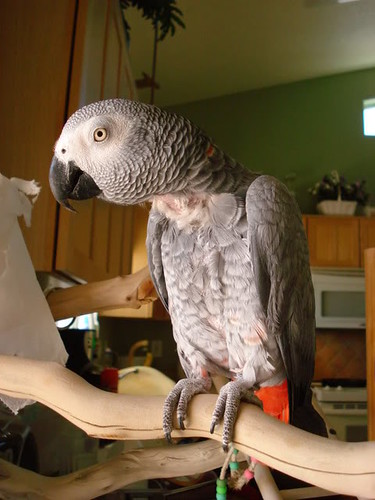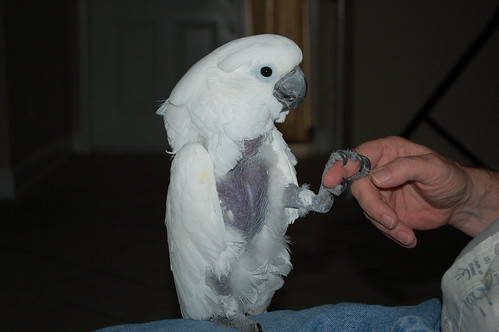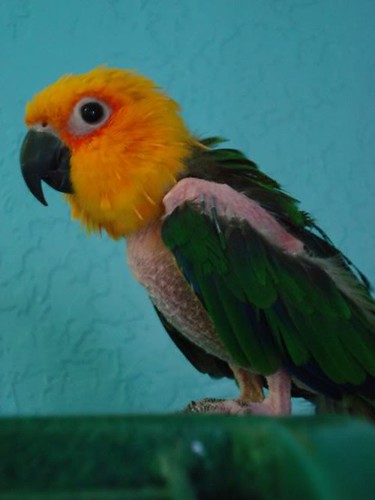
Congo african grey
I had a long conversation about 6 months ago with a woman that I had known for years from bird forums I was active on. I always looked forward to her posts because her perspective on life was so unique. She has an african grey parrot that we’ll call “Margo” that provided her with endless stories to share.
“Helen”, a multiple bird owner with years of experience, always had the right answer to people’s questions. She would carefully craft her explanations in language that everyone could understand and she didn’t give up explaining until she was sure that the asker understood not only what to do, but why. She is one of the best and most knowledgeable bird owners I have ever come across.
After we caught up, I asked her how Margo was doing. I was expecting her to launch into one of her hilarious stories detailing Margo’s latest adventures, but instead she burst into tears.

blue and gold macaw
When she collected herself she explained to me that, about a year before, Margo started plucking and hasn’t stopped. Helen isn’t the type to care that her bird is plucked. Her ego wasn’t involved and this only served to strengthen her love for Margo. Her devastation came from the idea that, emotionally, Margo has been silently suffering.
Helen loves all of her birds, but Margo held a special place in her heart. About 10 years ago, the police found Margo in a cage in the back of a closet of a known drug house.The police believe a user had traded her for drugs. After a lot of red tape, she wound up in Helen’s care.
There is no telling what Margo went through in either of her former homes, and no one will ever know, but throughout the ordeal that followed her rescue, Margo surprised everyone with her resillience and willingness to forgive. Helen was smitten and Margo had a great new permanent home. And then, years down the road, she began to pluck.
Helen and I went over the obvious checklist for the probable causes of plucking:
- Health: There have been three visits to avian vets over the past year, with two different vets. All findings were the same and Margo is in great health. So we eliminated the medical possibilities and moved onto…
- Diet: Helen was surprised to discover that Margo had an excellent appetite right away and eagerly accepted the wide variety of foods offered in her new home. She is a great eater. Also, tests had shown no deficiencies, so that only left…
- Environment: This is biggest, broadest, most confusing category of all! This includes literally EVERYTHING that exists in Margo’s world: things indoors, things outdoors, smells, sounds, views from windows, proximity to doors, household pets, enrichment and exercise opportunities, human stress levels…it’s impossible to list everything.
We touched on every aspect of the environment that we could think of. It didn’t make sense that this was a repercussion of her ordeal 10 years ago. Why would it manifest in plucking now? Something had to have changed that affected Margo deeply and we searched for that answer and found nothing out of the ordinary. Finally, I said: “Maybe THAT’S the problem. Nothing has changed. Maybe she isn’t stimulated enough.” Maybe Margo was too comfortable. I reminded Helen that her bird used to run with a pretty fast crowd. We both laughed.

Umbrella cockatoo
When Helen charges into action, there’s nothing quite like it. When she does something, she goes all the way. I talked to her this weekend. The bare patch on Margo’s chest is nearly filled in and the feather destructive mentality hasn’t persisted.
I asked her what she did. After she told me, I wished I had asked what she hadn’t done. I can tell you that it began with a new cage for Margo and was finalized with a bird room being added onto the house. And everything in between.
She told me that the biggest change came about as she began to forgive herself for not recognizing that Margo was hurting inside. She feels certain that her own stress over the situation was exacerbating the behavior. When she calmed down, so did Margo. And that’s when she started to respond to the changes Helen was putting into play.

Sun conure
There are two messages I want to emphasize with this post:
- Don’t give up. Try anything and everything. Most importantly, don’t disregard certain ideas because it seems crazy that such a little thing might have such a big effect on your bird. When you have tried everything, go back again and do the things you passed by the first time.
- If you have a plucker, don’t think of yourself as a bad owner. This happens in homes where birds receive the very best that humans have to offer. Don’t beat yourself up. It will stand in the way of finding a solution.
Author Patty Jourgensen specializes in avian health, behavior and nutrition and has been working with and caring for rescue birds since 1987.



13 comments
We got given a African grey female. After approx 3 months she started plucking. We don’t understand why. She goes where ever we go. She has free reign of the house goes all over so it’s not like she is locked in a cage. Don’t understand.
I’ve had my african grey rocky 14 years but now he’s started plucking his feathers out I’ve tried everything but nothing seems to be working and on his normal feather they look really dry
Hi i have an African grey and she keeps plucking all around her neck im seeking some advice on how I can stop her from doing this thank you
After an earthquake in Northern California my African Grey had several broken blood feathers and had self mutilated himself. I rushed him to the vet in the city. He had lost a lot of blood. One week later my baby was doing well. Dancing and singing and with much improvement we went back for a follow up visit. Because he had chewed up several collars the vet decided to put on a neck collar. We brought him home and he’s been lethargic ever since. He’s fallen and can’t move, getting around is difficult and he doesn’t want to interact with the family any more. The collar is cumbersome and is attached by little plastic anchor devices in holes. I’m not sure if I try to remove it with wire snips if it will come apart. My poor baby has black and blue circles around his eyes from the stress. It’s my belief that this vet went to far trying to keep us coming back for more “follow up visits” . Does anyone know how to remove this type of collar?
I have an African Grey who used to pluck all his chest feathers out every year. I got him as a present from my brother when we bought a house together when he was single/divorced. It had started when my brother had put him in a pet shop as a border while he didn’t have his own place (when he was going though the divorce). After I got him as a present his feathers slowly grew back without my doing anything except spending a lot of time in the room I kept him in. But several years later every winter he would pluck feathers again … sometimes even in the nice weather. His health was OK … I had to figure out how to fix the problem so I started surfing the web for answers. I tried everything … more attention … more toys in the cage … a humidifier in the room … spraying his feathers with warm water in a gentle mist. Although they helped a little they never fully corrected the problem. I had run out of suggestions to try that I found on the web. Then I decided to try some things on my own to see if anything fixed the problem entirely. What ended up working for me was adding a calcium block to the cage … … And I added a few Bioplasma Cell Salts to his drinking water every day … http://www.totaldiscountvitamins.com/product/20939/homeopathy Problem gone almost immediately … it just took the time for the feathers to grow back the plucking stopped the next day after I gave him the calcium block and cell salts. And boy did he chew up that calcium block for the first couple of days! Although I had not read of a link between low calcium levels and feather plucking before trying this I now have found articles about mineral deficiencies and feather plucking. African Greys are particularly prone to developing a calcium deficiency … and they’re also more affected with feather plucking than many other breeds of parrots … could THIS be the reason? Is this the connection? http://www.birdchannel.com/bird-words/hypocalcemia.aspx So if anyone out there has a bird with a feather plucking problem you might want to try this to see if it helps. My bird is good as new !!! Perfect coat of beautiful healthy feathers! Looks young and handsome again! In fact he looked So-o-o-o-o-o good I started taking Bioplasma cell salts in my water bottle everyday and I bought a cheap cheese grater at the Dollar Tree and used it to scrape some calcium from a bird block and added it to my dessert … I like Banana flavored and yes I do feel better even if I don’t have feathers. http://www.drlwilson.com/articles/calcium.htm Does stress cause the feather plucking or is the mood of the bird effected by the calcium deficiency … they may all be connected. From the link to the article on Calcium … “Those who live in a fight-or-flight pattern much of the time are continuously losing calcium in their urine.” Low calcium causes anxiety … and stress causes loss of calcium … a circle that continues if calcium is not sufficient in the diet. Joanne J
I have a Africa Gray parrot, for 6 years! For the last 6 mounts he is out site by the pool area, now it is a cool out site and I move him in-site the house. After 2 days he is in site the house he is plucking his feathers on his back, I’m very worry about my parrot! If any body have one that can giving me ideal what I have to do? I’m very please.
I just got a Grey from a some one on Craigs list and shes a plucker, I been trying to get her to stop and Im trying everything posible to do so, I will not give up on her.
Try adding minerals to the diet, especially sulphur to prevent and stop the feather plucking.
thank you for reminding us – birds are emotional beings as well! years ago my goffin cockatoo Alice went through a period of plucking. I had her tested and examined – all of the above. what I realized in the end was it was MY stress – a bad job situation – that was effecting her. When I changed careers and found much more peace and job satisfaction, Alice stopped plucking. It hasn’t been a problem ever since!!
Think lack of humidity too! My African grey, Gigi, after moving to west Texas started a 3 day assault on every feather she could remove. Vet said she was nuts and prescribed haldol, which I never gave her. The next day I found her upstairs looking down from the shower as she had climbed up the shower curtain with her Elizabethan collar on. She looked at me with her all knowing eyes and said ‘I wanna shower’! I got in the shower, brought her pink body under the stream, she just loved it. She had never done this before, or after. I said to her, you have been itching yourself to death. I bought 6 humidifiers, the humidity was single digits, and got it above 30 and she is getting all her feathers back. It is a devastating experience, but thankfully she told me what was wrong!!! Craig,
thanks for your coments i have a macaw i wish i had help with she make me cry i;ve tryed every thing thanks
My African Grey “Bella” plucked out her tail feathers and several breast feathers when I changed our family room into a dining room. The renovation required that she moved out of the room for a few days. This stress was the reason. I have also bought a vaporizer for the new room she is in, since if it gets to dry in the winter, their skin gets dry and will cause the plucking. Hope this helps. Bella is looking much better these days.
This is a great post, thank you for sharing. I have 2 macaws, B & G (18) GW (17), the B & G was in a pet store as a baby until 6 months old when we brought her home. She was in a tiny cage at night and during the day she was out, low enough for the kids and others to tease her. It was heart breaking to see, which is why we bought her. She used to bite and chew at her wing feathers until they would bleed! She checked out fine at the vet. She finally stopped doing that and seemed happy as could be. We moved into a different home about 10 years ago. About a year after moving she started loosing feathers, she has a bare belly now. It seems she has stopped plucking but her feather never grew back in. She’s a high strung gal so we keep her busy with foraging fun and lots of activities. Not sure why her feathers won’t grow back in but maybe there’s still hope!
Leave a comment